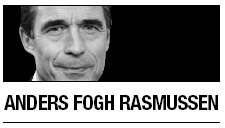BRUSSELS ― Many years ago, I took my children to visit the sites of the D-Day landings in Normandy. I wanted them to understand the sacrifices that others had made so that Europe and North America could enjoy the benefits of life, liberty, and the pursuit of happiness. We saw the beaches whose names echo through history ― Omaha, Utah, Juno. Those beaches remain a memorial to the idea that, together, we can overcome any threat, no matter how great.

We understand the future that could have befallen not only Europe, but the entire world, if North America had not helped Europe in its hour of need. And we know that those landings created a unique bond between our continents.
That bond remains vital for the preservation of our values and our security. But, after the Cold War, many assumed that its institutional embodiment ― the North Atlantic Treaty Organization ― would fade away. It did not, because our bond is based not just on common threats, but on shared ideals. It could no more fade away than our desire for freedom could wane. NATO needed no external reasons to exist. Yet history would provide them soon enough.
In Bosnia and Kosovo, NATO intervened to stop massive human-rights violations. In Libya, we enforced a United Nations Security Council resolution to protect civilians. And in Afghanistan, we are denying a safe haven to extremists.
The Alliance has evolved into a true security-management organization that is flexible, efficient, and cost-effective. The threats have changed, and become more global, and we have changed to meet them.
NATO is developing a ballistic-missile defense capability to protect our European populations and territory against a grave and growing threat. In the Indian Ocean, NATO is working with the European Union and many others to police major sea lanes threatened by pirates. And, in countries around the world, it carries out tasks such as de-mining, disaster relief, advising on how to bring military forces under democratic control, and working closely with the U.N. to prevent harm to children.
Efforts like these may not make headlines. But security is like health ― you never notice it until it takes a turn for the worse. This is why you need insurance. And NATO is the most solid security insurance that the world has. Underwritten by 28 members, it has delivered security benefits to all Allies, year after year, for more than six decades.
This weekend in Chicago, representatives of roughly 60 member states, partner countries, and international organizations will assemble for NATO’s latest summit, the largest in the Alliance’s history, to tackle some of the biggest security questions of our time.
Our discussions will focus on three issues: the transition to full Afghan security responsibility, the continued development of Allied military capabilities, and NATO’s global network of partnerships.
First, we will reaffirm our commitment to Afghanistan’s stability and security. Over the next few months, our role will shift from combat to training and mentoring. And, by the end of 2014, Afghans will have full responsibility for their own security.
Second, as our military involvement in Afghanistan nears completion, we must look ahead and develop new capabilities for a new era. At a time when defense budgets are being slashed across the Alliance, this requires a new approach.
By working together to maximize our assets and resources, we can do more with what we have. This is the essence of “Smart Defense.” In Chicago, the Allies will commit to this approach as a long-term strategy for improving NATO’s capabilities.
Finally, partnerships will figure prominently on the agenda in Chicago. Over the past 20 years, NATO has created a network of security partnerships with countries around the world. Unlike Allies, partners are not covered by Article 5, the North Atlantic Treaty’s collective-defense clause. But transnational threats demand multinational solutions, and our partnerships help us to address common challenges.
NATO holds regular consultations with all of our partners. The Alliance helps interested partners with defense reform. And many of our partners bring valuable capabilities and expertise to our operations.
I began by noting my personal identification with the bond between North America and Europe. But this attachment goes deeper than you think. Chicago has long been a home for many European immigrants. My own son lives in Illinois, not far from Chicago, with his wife and two children. Of my four grandchildren, two are European and two are American.
When I think about reasons to preserve our transatlantic bond for future generations, I don’t think about my security. I think about theirs. And that is the only reason I need.
By Anders Fogh Rasmussen
Anders Fogh Rasmussen is secretary-general of NATO. ― Ed.
(Project Syndicate)








